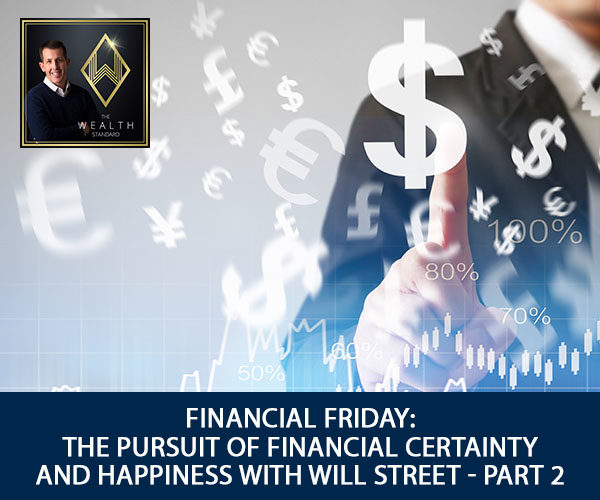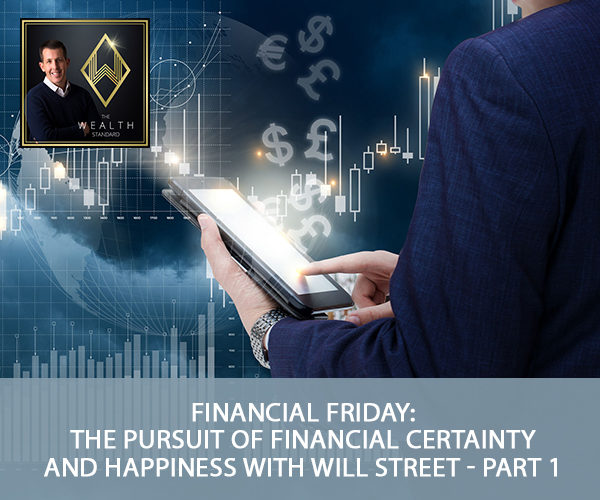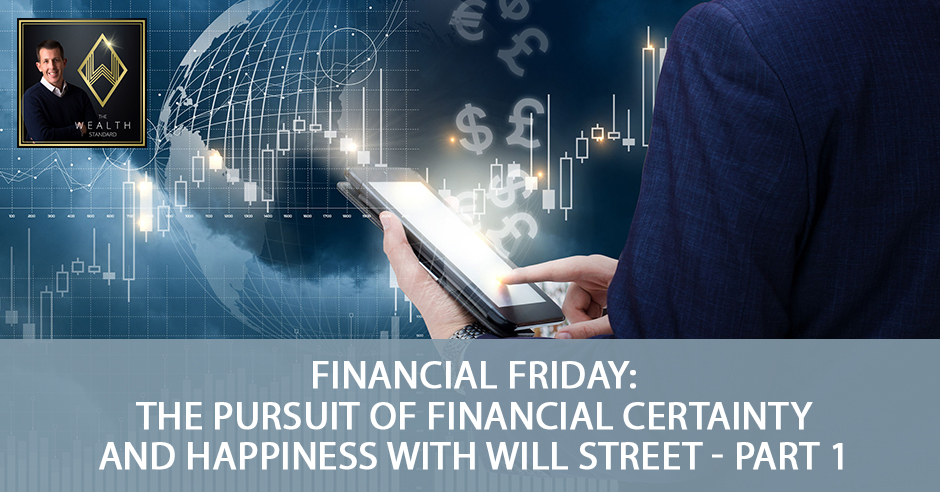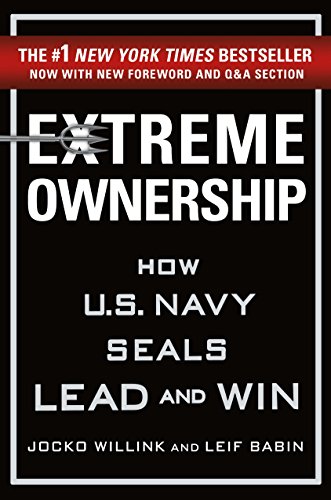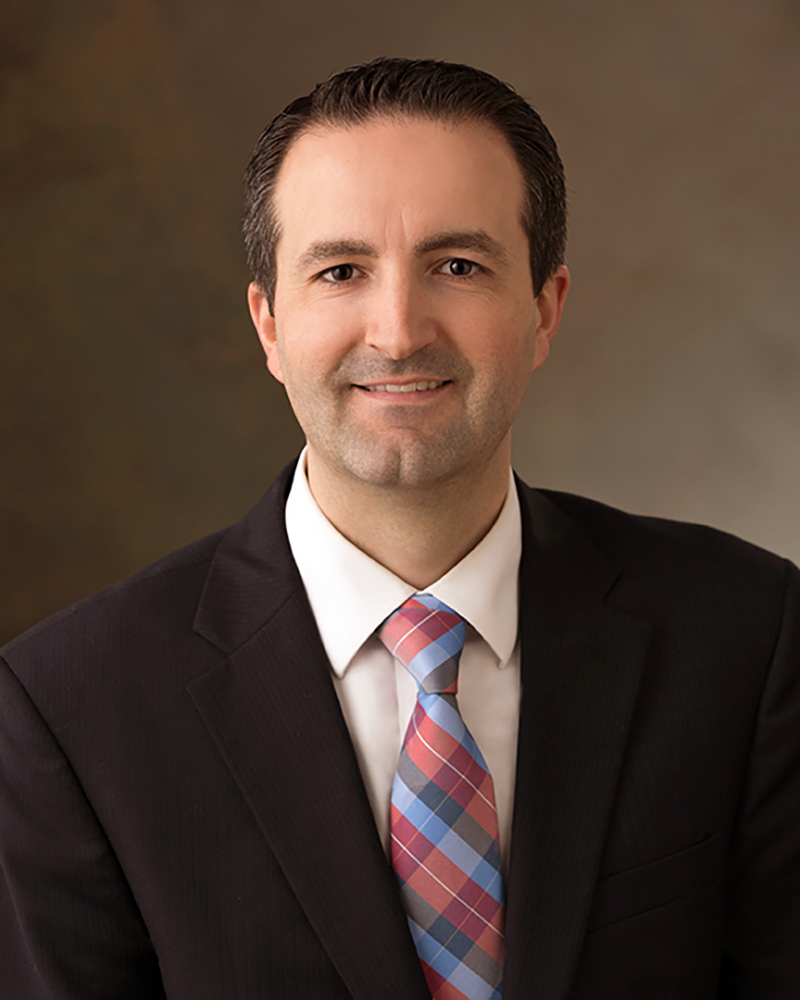The Pursuit Of Financial Certainty And Happiness with Will Street – Part 2
Podcast: Play in new window | Download
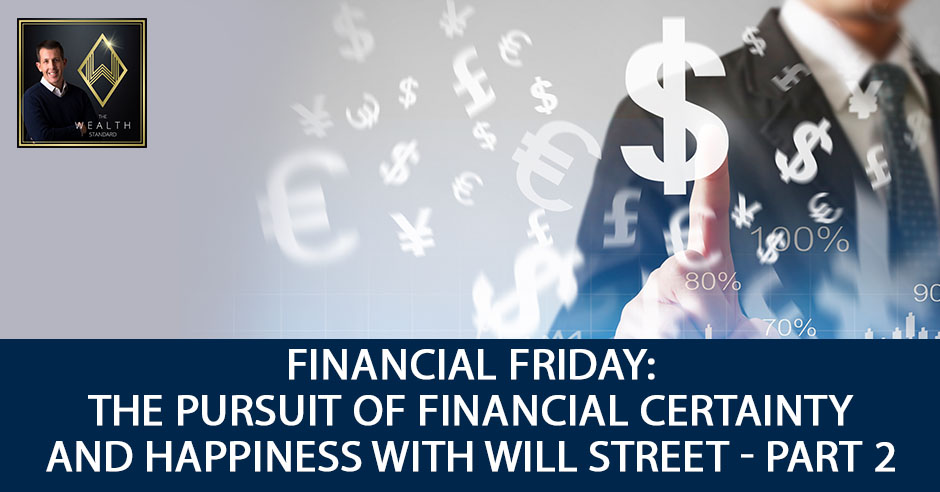
In this second part of Financial Friday, we are still with wealth strategist Will Street as we move on to talking about the pursuit of financial certainty and happiness. We examine a scintillating article published by the Business Insider, detailing a woman’s insight by studying 600 millionaires on the effects of where you choose to live to building wealth. We discuss the importance of putting one’s happiness and where they find meaning in life to the equation of wealth-building. Learn how to balance financial certainty and security with real life, taking into account friendships, family, and environment. Know that we don’t have to give up the enjoyment of right now to the mirage of the good life in the future.
—
Watch the episode here:
Listen to the podcast here:
The Pursuit Of Financial Certainty And Happiness with Will Street – Part 2
Financial Friday
We are in part two. We started with part one last episode. We’re going to continue with a scintillating article. I’m here with my friend, Will Street. It’s an interesting article from Business Insider. It is the insight a woman had by studying 600 millionaires and she discovered where you choose to live has two effects on your ability to build wealth. First off, we’ll recap the last episode. What did you think of the last episode? How did you like that discussion?
To recap it a little bit, it was good because we talked quite a bit about building wealth in the right way and building it from the base up and talking about uncertainty. Where a lot of people go wrong is they thirst after this uncertainty, but they seek it out without having the proper foundation in place. Not every financial decision is going to pan out. If you’re out and about in search of success or financial freedom or whatever that means to you and when you come across one of those scenarios where it doesn’t pan out. If you don’t have the right foundation to fall back to, that’s when things become difficult for people. You shared a couple of examples of some of those failures, the Puerto Rican fish farm. You got to do the due diligence. Things aren’t always going to work out. In fact, often things don’t work out exactly according to plan. The best that you can do is put yourself in a position to weather the storm and to have the right type of foundation, the right base and to keep moving forward.
You should always try to live within the possibilities, not the limitations – Will Street Click To TweetThe other point that you made that I thought was super compelling was this idea about tier two. We used as examples a couple of tier two assets, real estate investments, starting a business. The investment in ourselves and finding something that drives us. Finding something that gives us purpose and meaning and the value that it brings as we feel that sense of drive to get out of bed and make it happen. If that’s what is driving us, more often than not, we’re going to have a whole lot more in the tank to be able to push forward and be successful.
It’s the distinction between escaping. Most people are pursuing retirement, which is the escape of what they’re doing because they wouldn’t choose to spend all of their time working in what they’re doing. They’d rather spend their time somewhere else. They’re trying to escape from that. We advocate the discovery of doing meaningful things. I referenced some Tony Robbins material that says that the most fulfilling life comes from discovering that meaning and then spending 50% to 60% of your time doing that, not all of it. That’s where you look at people that retire and are miserable or people that achieve tremendous wealth and then decide to take their own life.
Where that true, that core meaning wasn’t discovered. Money or success or something else they thought was going to help them to discover it, where it’s the other way around where you can discover it without achieving wealth. This is something that’s not talked about when it comes to financial planning or financial advice or what you should do with your money and I think that it’s a tragedy. Most typical retirement planning solves for a specific end, which I don’t think is the end that people are seeking. Let’s get into some typical financial advice by a woman who studied 600 millionaires and she discovered where you choose to live has two effects on your ability to build wealth.
Here are a couple of her claims. She says the key to wealth building is to live in a home that one can easily afford. If you live in a pricey home and neighborhood, you will act and buy like your neighbors. The more affluent the neighborhood, the more the residents spend on almost every conceivable product and service. If you’re high income-producing, high-consuming neighbors roll up to the driveway in a BMW or a Mercedes-Benz, it’s likely you’ll feel the urge to do the same. The pressure to keep up with the Joneses can also be affected by lifestyle creep. The tendency to spend more whenever one earns more. First off, let’s take her perspective. What is she saying? What is she trying to allude to when it comes to a person’s ability to build wealth?
One of the natural tendencies we have as humans is we value community. Click To TweetThe common expression that you hear is somebody who’s house-poor. She’s saying, “Don’t be house-poor. Don’t spend or don’t buy a house that uses up more than a certain percentage of your disposable income. That’s a term that is somewhat familiar is this idea being house-poor. That’s the first piece, the size of your mortgage relative to your income. The second is if you live in this neighborhood and you see the neighbor across the street rolled up in a new 7 Series BMW, my 3 Series is not adequate anymore. I need the 7 Series. I need the S-Class Mercedes. I can’t resist that urge. If I see that my neighbor has something that I don’t, I’ve got to keep up with him or her. We’ve got home automation, swimming pool in the backyard, we’ve got it all. Pickleball court is the latest. “My neighbor’s got the pickleball court. I need the ball court. I’m going to spend it, even if it means I’m spending now what I would otherwise save.”
One of the natural tendencies we have as humans is we value community. We value friendships. We value relationships. If you live in a certain neighborhood, you want to be a part of that. I don’t think there’s anything wrong with it. She categorized that the wrong neighborhood, then you are most likely going to spend more than you make and you’re going to get into financial trouble. That’s what she’s alluding to. You’re not going to save and then you’re going to affect your future or ruin it, or both. Consider billionaire investor Warren Buffett. He lives in a modest house worth 0.001% of his total wealth. This is a commonly held perspective. I understand the accumulation of wealth. If you spend less, you’re going to accumulate more. It’s hitting on the financial principle, not the lifestyle and the meaning behind where you live and the memories and the experiences. It approaches it from a purely economic standpoint.

Financial Certainty: Your home is not an asset because it does not produce cashflow.
The thing with economics is it doesn’t take into consideration human behavior. She’s saying that human behavior, you’re going to spend less and you’re going to have more to accumulate. Is there anything that’s lost? This is where we’ll pivot to the other side of the coin when it comes to home ownership, the home that you live in. I’ve heard it as your home is not an asset. Robert Kiyosaki talks a lot about that because your home doesn’t produce cashflow. Someone else isn’t paying your mortgage, you are. You’re putting money into the maintenance and you’re putting money into upgrading this and upgrading that. You have to have Mercedes-Benz and BMWs. I look at the value of living in a nice neighborhood, the value of living in a nice home and what value that provides you when it comes to lifestyle, meaning, memories, family, etc. What do you think of the other side of the coin? How could you say, “I see what you’re saying, but here’s another opinion?”
I see what you’re saying is this idea. It’s the Dave Ramsey budgeting. Is budgeting generally a good idea? To tip our cap to her a little bit, it would be generally should you not spend every disposable dime that you have on a mortgage? The flip side of that coin is that also doesn’t mean that you should live in a studio apartment if you don’t have to. You don’t need to live in a trailer park if you don’t have to. There’s something to be said about a good safe neighborhood with good schools and a good community feel where it’s safe to walk on the sidewalks at night and spend time together as a family. The other flip side to this hyper-focus on budgeting and saving and as most people probably do, you probably have met people in the past who are hyper-focused on saving a nickel. They drive 30 miles to save a nickel on gas. The rational person would be like, “What did you do? Why did you do that?”
Your environment has more to do with your experience of life than you think. Click To TweetThe flip side there is you can take it to the extreme, where generally, are there some good core principles there? The flip side to that is the happiness piece, the safety piece, the security, the peace of mind. Especially when you consider how much time you spend at home with your family and the experiences all of us want to have with our families. Your house is the key component of that. You can do all that without obsessing over the neighbor’s car and making sure that you put in the pickleball court that’s slightly bigger than your neighbors.
These are all good points. I’m going to continue on with this perspective, hitting on some different things. I understand this person’s point of view and she makes valid economical points. At the same time, if you look at what life is about according to me and it’s different for everybody. I’ve had lots of clients. There’s a period of time within a year that they had divorces, eight or nine people all got divorced and they were around the same age as me. One, in particular, hit home to me because he had made the statement, “All the work I’ve done, everything I’ve done has all been for my family and now they’re gone.” He built tremendous wealth. He worked all the time. I look at that and his intention was genuine. His actions didn’t necessarily correspond to that. You look at a home and where you live. It’s like, “That’s what gives life meaning is the memories and things you can do with your family.” I’d also say the friendships that you have.

Financial Certainty: Your environment has a lot to do with the ideas that are in your mind, the expectations you have of yourself, and the questions you ask others.
If you look at living in an affluent neighborhood, it’s affluent for a reason. They may drive BMWs or Mercedes-Benz, but the conversations that I’ve had with people in my neighborhood, I would not have had in another neighborhood. I look at my neighbor next door. I’ve had some fascinating conversations with him. He runs a microfinance bank and he consults with countries. He does a lot of work in Myanmar, Asia and Africa. It’s fascinating to have these conversations with him. He’s a computer programmer by trade. Those are the conversations. Those are the things that you can learn and be inspired by people. I have a neighbor that lives across the street and he’s been a successful attorney. What he knows and the books that he’s read. I have incredible conversations with him and we’ve made other friendships as well. I look at what’s the price of those relationships? What’s the price of those friendships? What ideas have they given that would not have come by living in a neighborhood that was 0.001% of your income? I looked at that and there are many intangibles associated with it.
Getting to this person’s point, how can you have both? How can you be responsible? How can you have the experience of life right now, not waiting 30 years or 20 years down the road to retirement where you are able to have the permission slip to experience life? This comes down to your financial education. It’s understanding a financial statement, money in, money out. If you can’t afford the neighborhood, it isn’t, “We have to live in another neighborhood.” It’s asking the question, “How can I live in that neighborhood? How can I live in that home?” That starts to engage a part of your brain where you start to look for opportunities. You may not be able to live there at this point or this point, but at some point, you may be able to live there. It’s the pursuit of that because you figured out ways to make more money. I look at the home that we live in.
We’ve lived in the same neighborhood for many years. This is the third home in the neighborhood, but I lived on the outskirts for a number of years. We almost moved a few times, especially during the financial crisis but it’s because this neighborhood is somewhat affluent neighborhood and it’s because I had established relationships there. I had friendships there and I wanted to also have a nice house for my family and also a happy wife because happy wife equals happy life. It was one of those things where I could have taken the money that went into a house and invested it. I would have had more money, have more cashflow, at the same time, I wouldn’t have had the experiences with my family.
You look at what that does to your soul, what that does to your drive. It can affect many different things. That’s the conversation that’s not typically had with these types of articles. They give you this, “Step one is to make sure that your mortgage payment is less than 20% of your earned income,” which are always technical steps and there’s merit to some of those. It’s disempowering because it almost assumes that you’re at the income level you’re going to be for the rest of your life and you better deal with it. If you want to retire one day, you better scrimp and save and not enjoy life until you’re 65. I don’t think that’s the right mentality. They may not say that’s what they mean. That’s the feeling you get.
You're one idea away from a totally different life. Click To TweetThat’s where the motivation comes from where in order to build wealth, you don’t figure out how to earn more and be more valuable, but you scrimp and save based on the money you are earning. That’s the only money you’re going to earn. That money there is going to somehow compound and grow and you have enough money to live for the rest of your life at 65. It’s a narrative that is disempowering. Looking at our perspective, it doesn’t mean that you need to go out and buy a beautiful home and BMWs and Mercedes, but you need to start asking different questions. There’s merit to her perspective. There’s also merit to the other perspective. Hopefully, you’re seeing that. You sit on the edge. It’s up to you to determine what’s right for you at this point.
I can resonate with a lot of what you said about the neighborhood that you live in. For us, we moved a few years ago. It wasn’t to try and get into some fancy neighborhood where we wanted to be surrounded by a bunch of gazillionaires or anything like that. For us, it was family. We live within about a mile or so of my wife’s two brothers. The result of that is we live in a neighborhood that we love, that we’re comfortable with, that’s a good neighborhood. The interaction with our kids among their cousins and holidays and things like that, it’s a completely different dynamic.
The thing that’s interesting is for me, I didn’t grow up like that. It’s one of those things where I would have been stuck in that old mentality. I would have imposed this artificial ceiling on myself that, “We can’t do that. We got to take where we are right now, assume that that’s our maximum and operate from that level and below. We can’t do that.” My wife helped me stretch a little bit and see opportunity, meaning and value. Now that we’re there, my kids are having a completely different experience as kids from what I had. The family is so much more critical, so much more part of their everyday lives than it was for me. I wouldn’t trade that for anything. It’s huge.
Your environment has more to do with your experience of life than you think. It’s the environment, whether it’s where you live, the culture of your office and the social networks that you’re in. Those are environments and that environment can make life miserable or it can totally empower you. It can also stretch you. I’m going to give you one example. This was a long time ago, but after my sophomore year of college, I went to a hockey camp in Minnesota. It was sponsored by the Anaheim Ducks. It was a humbling experience because I was in an environment of these Triple-A players. There are a couple of pros there, it was a camp where it was training but also spotlight. I remember getting out onto the ice the first time and the speed that they were warming up. For me, it’s the speed of a game where it was all out. What it did, it raised my level of play because I was in an environment that stretched me. I believe that anybody can be stretched. Anybody can make more of a difference tomorrow than they did now.
A lot of it depends on the environment that you’re in. Some of it depends on your internal drive and what you want for life, your vision, your mission. Your environment has a lot to do with the ideas that are in your mind, the expectations you have of yourself, the questions you ask yourself and the questions you ask others. You’re one idea away from a totally different life. You’re one decision away from a totally different life. Your environment influences a lot of that. That’s why I try to go to events. I try to participate in mastermind groups. I try to be around individuals who are inspiring, who are pushing the limits, that doesn’t settle for the status quo. That inspires me, it helps me stretch. If I didn’t have that, it would be more difficult for me to do that. What do you think of part two?
We dissected it pretty well. There’s always a second side or even a third.
Life needs to be valued and celebrated. Click To TweetIt’s one of those things where I find it disheartening sometimes that people sacrifice the enjoyment of life right now for what I consider a mirage of the good life in the future. Sacrificing now, I don’t think you’re suddenly going to have an amazing life when you retire or you achieve success. Life needs to be valued and celebrated.
I think so much of those limitations are mental. I can remember as a kid growing up where I had some friends who were better off than we were financially. They came from amazing families. I got to see from the inside. I had friends whose families were awesome and who included me in a lot of what they did, vacations and stuff like that. I got to be able to see it from the inside. My parents were that limiting frame of mind. They would refer to my friend’s families. It was with some jealousy and with, “We could never afford to do that. It’s nice that they can do those types of things, but we can’t do any of those things.”
I was living in an environment where I was hearing all these limitations, but I was spending a significant amount of time within these other environments where I was seeing everything that was possible. It’s not like they were burning $100 bills for the fun of it because they had so much money. It wasn’t anything like that. They prioritized what was important to them and they lived within that framework. Early on in my teenage years, I consciously made the decision what I wanted. I wanted out of where I was, that mindset, those limitations. I wanted to gravitate toward what my friends’ families had. The number one reason why I went on to become an attorney was that my best friend’s dad was an attorney. I saw the family dynamic. I saw the lifestyle. I saw what they did together as a family and what I didn’t do. I bee-lined it straight for that.
The idea was nurtured over the course of time, but it may have come in one experience. Those ideas can come frequently if you’re in the right environment. That happened to be the circumstance at the time for you. You can intentionally be in certain environments that can inspire you, stretch you and push you beyond what you consider your limitations. Hopefully, this has been a valuable episode for you guys. It’s setting the stage for some future ones that we’re going to do when it comes to investment and also some other financial strategies. Thanks for joining us. Make sure you go and listen to our past episodes as well as our primary episodes. We’ve had some awesome ones, G. Edward Griffin, Lawrence Reed, it was fun interviewing those guys. The topic’s capitalism so learn about capitalism. We’ll see you on the next episode. Thanks.
Important Links:
- Will Street
- Last episode – previous episode
- G. Edward Griffin – Previous episode
- Lawrence Reed – Previous episode
- www.ParadigmLife.net
- https://ParadigmLife.net/about/will-street/
- https://www.LinkedIn.com/in/william-street-jd-21a4b213/
About Will Street
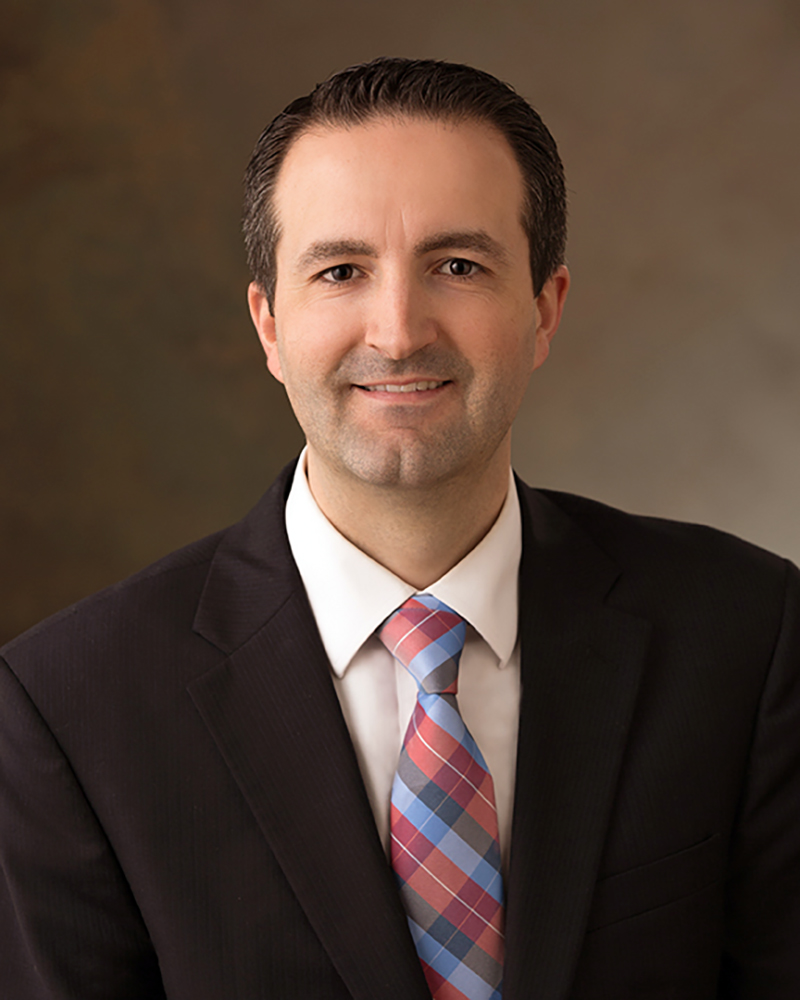
Will earned his Bachelor of Arts degree from Brigham Young University in 2005. After graduating from BYU, Will attended the University of Iowa College of Law and received his Juris Doctor in May of 2008. Will began practicing law with the law firm of VanCott, Bagley, Cornwall & McCarthy the oldest and one of the most well-respected law firms in the State of Utah. Will’s practice focused primarily on consumer finance-related litigation, consumer finance transactions, sale and purchase agreements, NDA’s, RFP’s, teaming agreements, security agreements, creditor’s rights in bankruptcy, and estate planning. Working directly with clients to analyze a problem, develop a solution, and working to ensure a successful resolution are what Will enjoyed most about being an attorney. Will comes to Paradigm after nearly six years in the private practice of law.
After his exposure to the Infinite Banking concept and seeing that his legal training would be directly relevant to his role at Paradigm, Will made the decision to leave his practice. Paradigm allows Will to continue to do what he enjoys most – develop client relationships, dissect problems, create solutions and work collaboratively with the client towards a successful resolution. Originally from the Tri-Cities area of Eastern Washington, Will currently resides in Salt Lake City with his wife, Sunny, and their three children.

